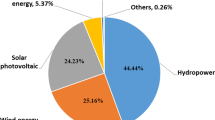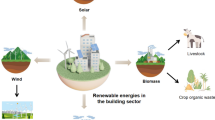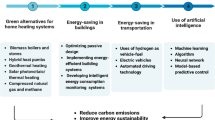Abstract
To promote the successful introduction of sustainable energy systems, more insight is needed into factors influencing consumer’s acceptance of future energy systems. A questionnaire study among 139 Dutch citizens (aged 18–85) was conducted. Participants rated the acceptability of energy systems made up of four varying system attributes: type of energy (renewable or fossil), price (remains stable vs. 25 % increase), adjustments in use (convenience technology or consumers themselves decide on what to change), and production level (energy is produced at a central vs. community vs. household level). Conjoint analyses were conducted to determine the overall acceptability of future energy systems, the relative importance of the various attributes for acceptability, and preference for levels within each attribute. Interesting patterns were uncovered: participants preferred making adjustments in use themselves (autonomous), rather than relying on technology to make the changes for them. Consumers did not exhibit a clear preference for any of the presented production levels, indicating that they would be open to change in this energy system attribute. Because participants preferred energy systems in which adjustments in use are made autonomously and because adjustment type was very important for overall acceptability of energy systems, technological developers and policy makers should take this into consideration.

Similar content being viewed by others
Notes
After discussion with various market parties (energy distribution companies), we decided that 25 % would constitute a plausible price increase.
References
Abrahamse, W., & Steg, L. (2013). Social influence approaches to encourage resource conservation: a meta-analysis. Global Environmental Change, 23, 1773–1785.
Abrahamse, W., Steg, L., Vlek, C., & Rothengatter, T. (2005). A review of intervention studies aimed at household energy conservation. Journal of Environmental Psychology, 25(3), 273–291.
Bolderdijk, J. W., Steg, L., Geller, E. S., Lehman, P. K., & Postmes, T. (2013). Comparing the effectiveness of monetary versus moral motives in environmental campaigning. Nature Climate Change, 3, 413–416.
Bolsen, T., & Cook, F. L. (2008). The polls—trends: public opinion on energy policy: 1974–2006. Public Opinion Quarterly, 72(2), 364–388.
Börjesson, M., Eliasson, J., Hugosson, M. B., & Brundell-Freij, K. (2012). The Stockholm congestion charges-5 years on. Effects, acceptability and lessons learnt. Transport Policy, 20, 1–12.
Burkhardt, J. J., III, Heath, G. A., & Turchi, C. S. (2011). Life cycle assessment of a parabolic trough concentrating solar power plant and the impacts of key design alternatives. Environmental Science and Technology, 45(6), 2457–2464.
Clastres, C. (2011). Smart grids: another step towards competition, energy security and climate change objectives. Energy Policy, 39(9), 5399–5408.
De Groot, J., & Steg, L. (2008). Value orientations to explain beliefs related to environmental significant behavior: how to measure egoistic, altruistic, and biospheric value orientations. Environment and Behavior, 40(3), 330–354.
Deci, E. L., & Ryan, R. M. (1985). Intrinsic motivation and self-determination in human behavior. New York: Plenum.
Faiers, A., Cook, M., & Neame, C. (2007). Towards a contemporary approach for understanding consumer behaviour in the context of domestic energy use. Energy Policy, 35(8), 4381–4390.
Gellings, C. W., & Samotyj. (2013). Smart Grid as advanced technology enabler of demand response. Energy Efficiency. doi:10.1007/s12053-013-9203-0.
Gerpott, T. J., & Mahmudova, I. (2010). Determinants of green electricity adoption among residential customers in Germany. International Journal of Consumer Studies, 34(4), 464–473.
Green, P. E., & Srinivasan, V. (1990). Conjoint analysis in marketing: new developments with implications for research and practice. Journal of Marketing, 54(4), 3–19.
Grothe, O., & Schnieders, J. (2011). Spatial dependence in wind and optimal wind power allocation: a copula-based analysis. Energy Policy, 39(9), 4742–4754.
Hansla, A. (2011). Value orientation and framing as determinants of stated willingness to pay for eco-labeled electricity. Energy Efficiency, 4(2), 185–191.
Hanssen-Gram, K. (2013). Efficient technologies or user behavior, which is the more important when reducing households’ energy consumption. Energy Efficiency, 6(3), 447–457.
Jost, J. T., Banaji, M. R., & Nosek, B. A. (2004). A decade of system justification theory: accumulated evidence of conscious and unconscious bolstering of the status quo. Political Psychology, 25(6), 881–919.
Laroche, M., Bergeron, J., & Barbaro-Forleo, G. (2001). Targeting consumers who are willing to pay more for environmentally friendly products. Journal of Consumer Marketing, 18(6), 503–520.
Louviere, J. J. (1988). Analyzing decision making: metric conjoint analysis. Newsbury Park: Sage.
Marcus, A., & Jean, J. (2009). Going green at home: the Green Machine. Information Design Journal, 17(3), 235–245.
Martins, F. R., & Pereira, E. B. (2011). Enhancing information for solar and wind energy technology deployment in Brazil. Energy Policy, 39(7), 4378–4390.
Mitchell, T. R., Thompson, L., Peterson, E., & Cronk, R. (1997). Temporal adjustments in the evaluation of events: The “Rosy View”. Journal of Experimental Social Psychology, 33(4), 421–448.
Niemeyer, S. (2010). Consumer voices: adoption of residential energy-efficient practices. International Journal of Consumer Studies, 34(2), 140–145.
Noppers, E., Keizer, K., Bolderdijk, J. W., & Steg, L. (2014). The adoption of sustainable innovations: driven by symbolic and environmental motives. Global Environmental Change, 25, 52–62.
Oldfield, E. (2011). Addressing energy poverty through smarter technology. Bulletin of Science, Technology and Society, 31(2), 113–122.
Palmer, K., Walls, M., Gordon, H., & Gerarden, T. (2013). Assessing the energy-efficiency information gap: results from a survey of home energy auditors. Energy Efficiency, 6(2), 271–292.
Pelham, B. W., & Blanton, H. (2012). Conducting research in psychology: measuring the weight of smoke. Belmont: Wadsworth.
Press, M., & Arnould, E. J. (2009). Constraints on sustainable energy consumption: market system and public policy challenges and opportunities. Journal of Public Policy and Marketing, 28(1), 102–113.
Samuelson, W., & Zeckhauser, R. (1988). Status quo bias in decision making. Journal of Risk Uncertainty, 1, 7–59.
Sanders, D., Clarke, H. D., Stewart, M. C., & Whiteley, P. (2007). Does mode matter for modeling political choice? Evidence from the 2005 British Election Study. Political Analysis, 15, 257–285.
Schuitema, G., Steg, L., & Forward, S. (2010). Explaining differences in acceptability before and acceptance after the implementation of a congestion charge in Stockholm. Transportation Research-A: Policy and Practice, 44(2), 99–109.
Schultz, P. W., Gouveia, V. V., Cameron, L. D., Tankha, G., Schmuck, P., & Franzek, M. (2005). Values and their relationship to environmental concern and conservation behavior. Journal of Cross-Cultural Psychology, 36, 457–475.
Steg, L., & Abrahamse, W. (2010). How to promote energy savings among households: Theoretical and practical approaches. In V. Corral-Verdugo, C. H. Garcia-Cadena, & M. Frias-Armenta (Eds.), Psychology approaches to sustainability: current trends in theory, research and applications (pp. 61–80). New York: Nova Science Publisher.
Steg, L., Perlaviciute, G., Van der Werff, E., & Lurvink, J. (2012). The significance of hedonic values for environmentally-relevant attitudes, preferences and actions. Environment and Behavior. doi:10.1177/0013916512454730.
van Boven, L., & Ashworth, L. (2007). Looking forward, looking back: anticipation is more evocative than retrospection. Journal of Experimental Psychology: General, 136(2), 289–300.
Whitehead, J. C., & Cherry, T. L. (2007). Willingness to pay for a Green Energy program: a comparison of ex-ante and ex-post hypothetical bias mitigation approaches. Resource and Energy Economics, 29(4), 247–261.
Wood, G., & Newborough, M. (2003). Dynamic energy-consumption indicators for domestic appliances: environment, behaviour and design. Energy and Buildings, 35(8), 821–841.
Yeager, D. S., Krosnick, J. A., Chang, L., Javitz, H. S., Levendusky, M. S., Simpser, A., et al. (2011). Comparing the accuracy of RDD telephone surveys and internet surveys conducted with probability and non-probability samples. Public Opinion Quarterly, 75, 709–747.
Author information
Authors and Affiliations
Corresponding author
Rights and permissions
About this article
Cite this article
Leijten, F.R.M., Bolderdijk, J.W., Keizer, K. et al. Factors that influence consumers’ acceptance of future energy systems: the effects of adjustment type, production level, and price. Energy Efficiency 7, 973–985 (2014). https://doi.org/10.1007/s12053-014-9271-9
Received:
Accepted:
Published:
Issue Date:
DOI: https://doi.org/10.1007/s12053-014-9271-9




